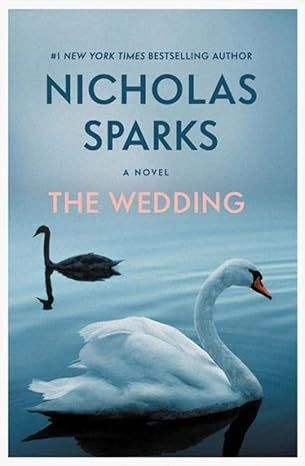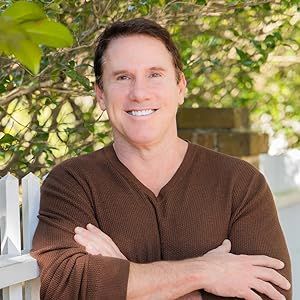The Wedding
4.6
-
11,893 ratings
In this stunning New York Times bestselling follow-up to The Notebook, a hardworking but distant husband vows to win back the love of his life by looking to Noah and Allie's legendary romance.
After thirty years, Wilson Lewis is forced to face a painful truth: the romance has gone out of his marriage. His wife, Jane, has fallen out of love with him, and it is entirely his fault. Despite the shining example of his in-laws, Noah and Allie Calhoun, and their fifty-year love affair, Wilson himself is a man unable to express his true feelings. He has spent too little time at home and too much at the office, leaving the responsibility of raising their children to Jane. Now his daughter is about to marry, and his wife is thinking about leaving him. But if Wilson is sure of anything, it is this: His love for Jane has only grown over the years, and he will do everything he can to save their marriage. With the memories of Noah and Allie's inspiring life together as his guide, he vows to find a way to make his wife fall in love with him...all over again.
In this powerfully moving tale of love lost, rediscovered, and renewed, Nicholas Sparks once again brings readers his unique insight into the only emotion that ultimately really matters.
Kindle
$8.99
Available instantly
Audiobook
$0.99
with membership trial
Hardcover
$28.18
Paperback
$9.35
Ships from
Amazon.com
Payment
Secure transaction
ISBN-10
1538745321
ISBN-13
978-1538745328
Print length
272 pages
Language
English
Publisher
Grand Central Publishing
Publication date
February 26, 2018
Dimensions
5.25 x 0.8 x 8 inches
Item weight
2.31 pounds
Popular highlights in this book
But love, I’ve come to understand, is more than three words mumbled before bedtime. Love is sustained by action, a pattern of devotion in the things we do for each other every day.
Highlighted by 2,388 Kindle readers
Frugality, I’ve learned, has its own cost, one that sometimes lasts forever.
Highlighted by 555 Kindle readers
The experts’ advice on improving a marriage? To focus on the four As—attention, appreciation, affection, and attraction.
Highlighted by 470 Kindle readers
Marriage is about compromise; it’s about doing something for the other person, even when you don’t want to.
Highlighted by 302 Kindle readers
Product details
ASIN :
B000FBJAEQ
File size :
1246 KB
Text-to-speech :
Enabled
Screen reader :
Supported
Enhanced typesetting :
Enabled
X-Ray :
Enabled
Word wise :
Enabled
Editorial reviews
From Publishers Weekly
The wistful, reflective tone of Sparks's newest love story shines through in Wopat's competent telling, but his characterizations, particularly of the book's Southern-bred females, are hampered by the deep tenor of his voice and his accent-less approach. However, his portrayal of methodical attorney Wilson Lewis is spot on. Realizing for the first time that his "innocent neglect" has led his relationship with his wife of 30 years to become stale, Wilson decides to court her. Unfortunately, he doesn't know how or where to start. Enter Noah Calhoun, Wilson's sage-like father-in-law, whose picture-perfect romance is depicted in Sparks's 1996 debut, The Notebook. Wilson now lives in a home for the elderly and spends his days watching over a swan that he believes holds his late wife's spirit. With Noah's patient guidance, and with the wedding of Wilson's daughter fast approaching, Wilson learns how to be the husband his wife deserves. Snippets of music announce the beginning and end of each chapter and complement particularly emotional moments. While this sweetly sentimental audio may be too subdued for a long, tiring drive, it will satisfy listeners looking for a calming nighttime diversion.
Copyright 2003 Reed Business Information, Inc.
From Booklist
Sparks returns to characters from The Notebook (1996) and writes about Allie and Noah Calhoun's oldest daughter, Jane, and her husband, Wilson. As their thirtieth anniversary approaches, Wilson realizes that he loves Jane now more than ever and worries that his neglect (he completely forgot their twenty-ninth anniversary) may have finally driven her away. Wilson plans on showing Jane how much he loves her, but then their oldest daughter, Anna, announces that she and her boyfriend are getting married and asks if they can plan a small utilitarian wedding on her parents' anniversary. Jane agrees to share the date and convinces Anna to have a formal wedding; something that Jane missed. Jane is surprised by Wilson's willingness to work and ability to come up with truly miraculous arrangements. This sort of involvement is out of character for Wilson, a workaholic estate attorney in New Bern, North Carolina, but he really is determined to change, and Sparks is at his romantic best in this tender love story about a flawed hero trying to right his wrongs. Patty Engelmann
Copyright © American Library Association. All rights reserved
Review
"Sparks's fans have from the very beginning eagerly anticipated a sequel to the romantic tale of Allie and Noah Calhoun. The wait is now over...Sparks tells his sweet story...[with] a gasp-inducing twist at the very end."―PublishersWeekly
"Nicholas Sparks follows up his beloved bestseller The Notebook with a touching novel about one man's attempt to save a failing marriage."―BookPage
"Sweet but packs a punch...There is a twist that pulls everything together." ―CharlotteObserver
About the Author
Nicholas Sparks is the author of twenty-four books, all of which have been New York Times bestsellers. His books have been published across more than fifty languages with over 150 million copies sold worldwide, and eleven have been adapted into films. He is also the founder of the Nicholas Sparks Foundation, a nonprofit committed to improving cultural and international understanding through global education experiences. He lives in North Carolina.
Read more
Sample
Excerpt. © Reprinted by permission. All rights reserved.
The Wedding By Nicholas Sparks
Chapter One
It's heartbreaking to think that your wife may not love you, and that night, after Jane had carried the perfume up to our bedroom, I sat on the couch for hours, wondering how this situation had come to pass. At first, I wanted to believe that Jane was simply reacting emotionally and that I was reading far more into the incident than it deserved. Yet the more I thought about it, the more I sensed not only her displeasure in an absentminded spouse, but the traces of an older melancholy-as if my lapse were simply the final blow in a long, long series of careless missteps.
Had the marriage turned out to be a disappointment for Jane? Though I didn't want to think so, her expression had answered otherwise, and I found myself wondering what that meant for us in the future. Was she questioning whether or not to stay with me? Was she pleased with her decision to have married me in the first place? These, I must add, were frightening questions to consider-with answers that were possibly even more frightening-for until that moment, I'd always assumed that Jane was as content with me as I'd always been with her.
What, I wondered, had led us to feel so differently about each other?
I suppose I must begin by saying that many people would consider our lives fairly ordinary. Like many men, I had the obligation to support the family financially, and my life was largely centered around my career. For the past thirty years, I've worked with the law firm of Ambry, Saxon and Tundle in New Bern, North Carolina, and my income-while not extravagant-was enough to place us firmly in the upper middle class. I enjoy golfing and gardening on the weekends, prefer classical music, and read the newspaper every morning. Though Jane was once an elementary school teacher, she spent the majority of our married life raising three children. She ran both the household and our social life, and her proudest possessions are the photo albums that she carefully assembled as a visual history of our lives. Our brick home is complete with a picket fence and automatic sprinklers, we own two cars, and we are members of both the Rotary Club and the Chamber of Commerce. In the course of our married life, we've saved for retirement, built a wooden swing set in the backyard that now sits unused, attended dozens of parent-teacher conferences, voted regularly, and contributed to the Episcopal church each and every Sunday. At fifty-six, I'm three years older than my wife.
Despite my feelings for Jane, I sometimes think we're an unlikely pair to have spent a life together. We're different in almost every way, and though opposites can and do attract, I've always felt that I made the better choice on our wedding day. Jane is, after all, the kind of person I always wished to be. While I tend toward stoicism and logic, Jane is outgoing and kind, with a natural empathy that endears her to others. She laughs easily and has a wide circle of friends. Over the years, I've come to realize that most of my friends are, in fact, the husbands of my wife's friends, but I believe this is common for most married couples our age. Yet I'm fortunate in that Jane has always seemed to choose our friends with me in mind, and I'm appreciative that there's always someone for me to visit with at a dinner party. Had she not come into my life, I sometimes think that I would have led the life of a monk.
There's more, too: I'm charmed by the fact that Jane has always displayed her emotions with childlike ease. When she's sad she cries; when she's happy she laughs; and she enjoys nothing more than to be surprised with a wonderful gesture. In those moments, there's an ageless innocence about her, and though a surprise by definition is unexpected, for Jane, the memories of a surprise can arouse the same excited feelings for years afterward. Sometimes when she's daydreaming, I'll ask her what she's thinking about and she'll suddenly begin speaking in giddy tones about something I've long forgotten. This, I must say, has never ceased to amaze me.
While Jane has been blessed with the most tender of hearts, in many ways she's stronger than I am. Her values and beliefs, like those of most southern women, are grounded by God and family; she views the world through a prism of black and white, right and wrong. For Jane, hard decisions are reached instinctively-and are almost always correct-while I, on the other hand, find myself weighing endless options and frequently second-guessing myself. And unlike me, my wife is seldom self-conscious. This lack of concern about other people's perceptions requires a confidence that I've always found elusive, and above all else, I envy this about her.
I suppose that some of our differences stem from our respective upbringings. While Jane was raised in a small town with three siblings and parents who adored her, I was raised in a town house in Washington, D.C., as the only child of government lawyers, and my parents were seldom home before seven o'clock in the evening. As a result, I spent much of my free time alone, and to this day, I'm most comfortable in the privacy of my den.
As I've already mentioned, we have three children, and though I love them dearly, they are for the most part the products of my wife. She bore them and raised them, and they are most comfortable with her. While I sometimes regret that I didn't spend as much time with them as I should have, I'm comforted by the thought that Jane more than made up for my absences. Our children, it seems, have turned out well despite me. They're grown now and living on their own, but we consider ourselves fortunate that only one has moved out of state. Our two daughters still visit us frequently, and my wife is careful to have their favorite foods in the refrigerator in case they're hungry, which they never seem to be. When they come, they talk with Jane for hours.
At twenty-seven, Anna is the oldest. With black hair and dark eyes, her looks reflected her saturnine personality growing up. She was a brooder who spent her teenage years locked in her room, listening to gloomy music and writing in a diary. She was a stranger to me back then; days might pass before she would say a single word in my presence, and I was at a loss to understand what I might have done to provoke this. Everything I said seemed to elicit only sighs or shakes of her head, and if I asked if anything was bothering her, she would stare at me as if the question were incomprehensible. My wife seemed to find nothing unusual in this, dismissing it as a phase typical of young girls, but then again, Anna still talked to her. Sometimes I'd pass by Anna's room and hear Anna and Jane whispering to each other; but if they heard me outside the door, the whispering would stop. Later, when I would ask Jane what they'd been discussing, she'd shrug and wave a hand mysteriously, as if their only goal were to keep me in the dark.
Yet because she was my firstborn, Anna has always been my favorite. This isn't an admission I would make to anyone, but I think she knows it as well, and lately I've come to believe that even in her silent years, she was fonder of me than I realized. I can still remember times when I'd be perusing trusts or wills in my den, and she'd slip through the door. She'd pace around the room, scanning the bookshelves and reaching for various items, but if I addressed her, she'd slip back out as quietly as she'd come in. Over time, I learned not to say anything, and she'd sometimes linger in the office for an hour, watching me as I scribbled on yellow legal tablets. If I glanced toward her, she'd smile complicitly, enjoying this game of ours. I have no more understanding of it now than I did back then, but it's ingrained in my memory as few images are.
Currently, Anna is working for the Raleigh News and Observer, but I think she has dreams of becoming a novelist. In college she majored in creative writing, and the stories she wrote were as dark as her personality. I recall reading one in which a young girl becomes a prostitute to care for her sick father, a man who'd once molested her. When I set the pages down, I wondered what I was supposed to make of such a thing.
She is also madly in love. Anna, always careful and deliberate in her choices, was highly selective when it came to men, and thankfully Keith has always struck me as someone who treats her well. He intends to be an orthopedist and carries himself with a confidence that comes only to those who've faced few setbacks in life. I learned through Jane that for their first date Keith took Anna kite flying on the beach near Fort Macon. Later that week, when Anna brought him by the house, Keith came dressed in a sports coat, freshly showered and smelling faintly of cologne. As we shook hands, he held my gaze and impressed me by saying, "It's a pleasure to meet you, Mr. Lewis."
Joseph, our second-born, is a year younger than Anna. He's always called me "Pop," though no one else in our family has ever used that term, and again, we have little in common. He's taller and thinner than I, wears jeans to most social functions, and when he visits at Thanksgiving or Christmas, he eats only vegetables. While he was growing up, I thought him quiet, yet his reticence, like Anna's, seemed directed at me in particular. Others often remarked on his sense of humor, though to be honest, I seldom saw it. Whenever we spent time together, I often felt as if he were trying to form an impression of me.
Like Jane, he was empathetic even as a child. He chewed his fingernails worrying about others, and they've been nothing but nubs since he was five years old. Needless to say, when I suggested that he consider majoring in business or economics, he ignored my advice and chose sociology. He now works for a battered women's shelter in New York City, though he tells us nothing more about his job. I know he wonders about the choices I've made in my life, just as I wonder about his, yet despite our differences, it's with Joseph that I have the conversations that I always wished to have with my children when I held them as infants. He is highly intelligent; he received a near perfect score on his SATs, and his interests span the spectrum from the history of Middle Eastern dhimmitude to theoretical applications of fractal geometry. He is also honest- sometimes painfully so-and it goes without saying that these aspects of his personality leave me at a disadvantage when it comes to debating him. Though I sometimes grow frustrated at his stubbornness, it's during such moments that I'm especially proud to call him my son.
Leslie, the baby of our family, is currently studying biology and physiology at Wake Forest with the intention of becoming a veterinarian. Instead of coming home during the summers like most students, she takes additional classes with the intention of graduating early and spends her afternoons working at a place called Animal Farm. Of all our children, she is the most gregarious, and her laughter sounds the same as Jane's. Like Anna, she liked to visit me in my den, though she was happiest when I gave her my full attention. As a youngster, she liked to sit in my lap and pull on my ears; as she grew older, she liked to wander in and share funny jokes. My shelves are covered with the gifts she made me growing up: plaster casts of her hand-prints, drawings in crayon, a necklace made from macaroni.
She was the easiest to love, the first in line for hugs or kisses from the grandparents, and she took great pleasure in curling up on the couch and watching romantic movies. I was not surprised when she was named the homecoming queen at her high school three years ago.
She is kind as well. Everyone in her class was always invited to her birthday parties for fear of hurting someone's feelings, and when she was nine, she once spent an afternoon walking from towel to towel at the beach because she'd found a discarded watch in the surf and wanted to return it to its owner. Of all my children, she has always caused me the least worry, and when she comes to visit, I drop whatever I'm doing to spend time with her. Her energy is infectious, and when we're together, I wonder how it is I could have been so blessed.
Now that they've all moved out, our home has changed. Where music once blared, there is nothing but stillness; while our pantry once shelved eight different types of sugared cereal, there is now a single brand that promises extra fiber. The furniture hasn't changed in the bedrooms where our children slept, but because the posters and bulletin boards have been taken down-as well as all other reminders of their personalities-there is nothing to differentiate one room from the next. But it was the emptiness of the house that seemed to dominate now; while our home was perfect for a family of five, it suddenly struck me as a cavernous reminder of the way things ought to be. I remember hoping that this change in the household had something to do with the way Jane was feeling.
Still, regardless of the reason, I couldn't deny that we were drifting apart, and the more I thought about it, the more I noticed how wide the gap between us had become.
We'd started out as a couple and been changed into parents- something I had always viewed as normal and inevitable- but after twenty-nine years, it was as if we'd become strangers again. Only habit seemed to be keeping us together. Our lives had little in common; we rose at different hours, spent our days in different places, and followed our own routines in the evenings. I knew little of her daily activities and admitted to keeping parts of mine secret as well. I couldn't recall the last time Jane and I had talked about anything unexpected.
Two weeks after the forgotten anniversary, however, Jane and I did just that. "Wilson," she said, "we have to talk."
I looked up at her. A bottle of wine stood on the table between us, our meal nearly finished. "Yes?"
"I was thinking," she said, "of heading up to New York to spend some time with Joseph." "Won't he be here for the holidays?" "That's not for a couple of months. And since he didn't make it home this summer, I thought it might be nice to visit him for a change."
In the back of my mind, I noted that it might do us some good as a couple to get away for a few days. Perhaps that had even been the reason for Jane's suggestion, and with a smile, I reached for my wineglass. "That's a good idea," I agreed. "We haven't been to New York since he first moved there."
Jane smiled briefly before lowering her gaze to her plate. "There's something else, too." "Yes?"
"Well, it's just that you're pretty busy at work, and I know how hard it is for you to get away." "I think I can clear up my schedule for a few days," I said, already mentally leafing through my work calendar. It would be tough, but I could do it.
Read more
About the authors
Nicholas Sparks
Nicholas Sparks is one of the world’s most beloved storytellers. All of his books have been New York Times bestsellers, with over 130 million copies sold worldwide, in more than 50 languages, including over 92 million copies in the United States alone.
Eleven of Nicholas Sparks's novels—The Choice, The Longest Ride, The Best of Me, Safe Haven, The Lucky One, The Last Song, Dear John, Nights in Rodanthe, The Notebook, A Walk to Remember, and Message in a Bottle—have been adapted into major motion pictures. The Notebook has also been adapted into a Broadway musical, featuring music and lyrics by Ingrid Michaelson.
Read more
Reviews
Customer reviews
4.6 out of 5
11,893 global ratings
Deborah Canada
5
Wonderful story!
Reviewed in the United States on August 1, 2024
Verified Purchase
I never knew there was a follow up to The Notebook. This is definitely worth your time! Loved this story!
Sally M.
5
One of the best love story ever written
Reviewed in the United States on January 6, 2024
Verified Purchase
I've always loved to read a good love story. I have read so many that I've lost count. But Nicholas Sparks have won hands down every single time. His work is just amazing. Just when you think nothing surprises you anymore & you see more wonderful surprises coming. What I love about this book: It sends a message out there to not take the people you love for granted. And one can change for the better if one really wants to. If you surround yourself with good friends & family they will be there for you. I would recommend this book from teens to over a 100 yrs old :-)
Read more
5 people found this helpful
Twinkie49
5
Wedding plans!!
Reviewed in the United States on April 28, 2024
Verified Purchase
Typical Nicholas Sparks!! Great story line. Encouraged me to look at what I am doing in my life. What a great book to keep you thinking. Loved it!!
Top Nicholas Sparks titles
View all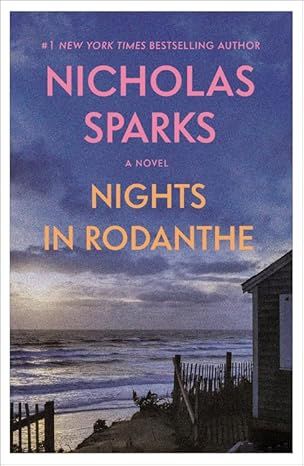
Nights in Rodanthe
4.6
-
3,717
$0.99
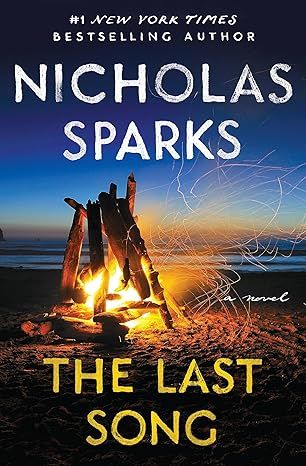
The Last Song
4.6
-
7,035
$0.99
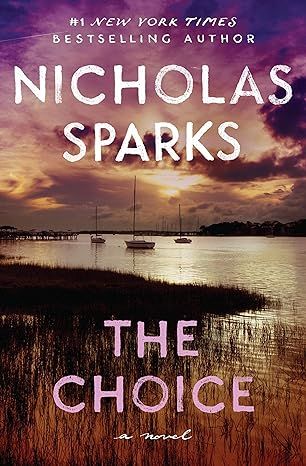
The Choice
4.4
-
22,262
$0.99
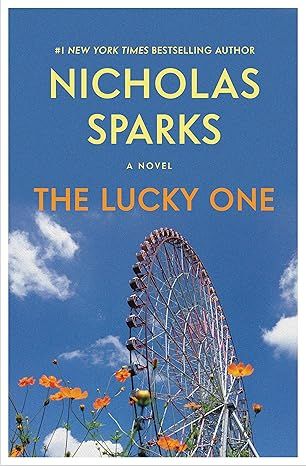
The Lucky One
4.6
-
8,044
$0.99
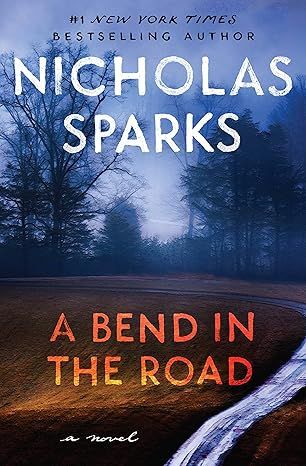
A Bend in the Road
4.6
-
9,069
$0.99
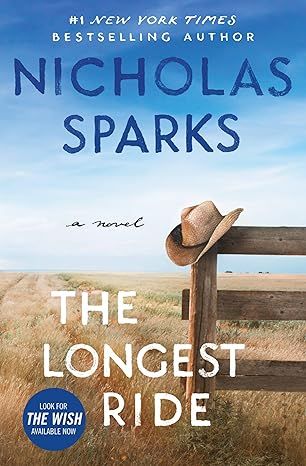
The Longest Ride
4.6
-
31,183
$0.99
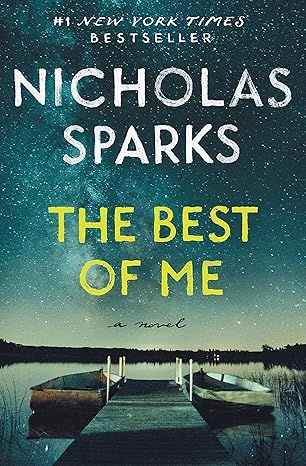
The Best of Me
4.5
-
18,103
$0.99
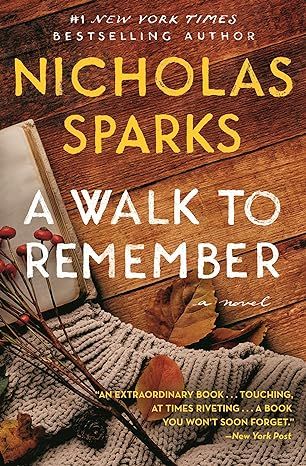
A Walk to Remember
4.6
-
11,841
$0.99
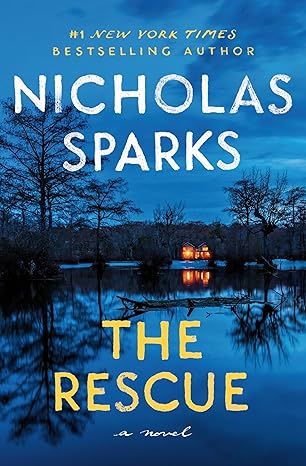
Rescue
4.5
-
25,514
$0.99
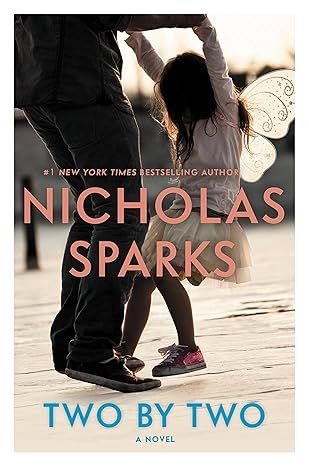
Two by Two
4.4
-
28,575
$0.99
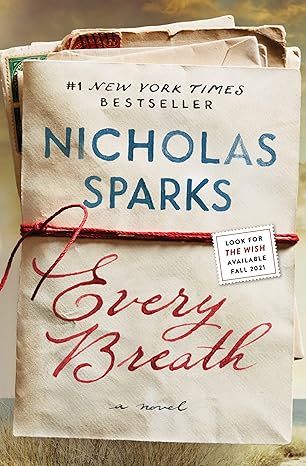
Every Breath
4.6
-
35,865
$0.99
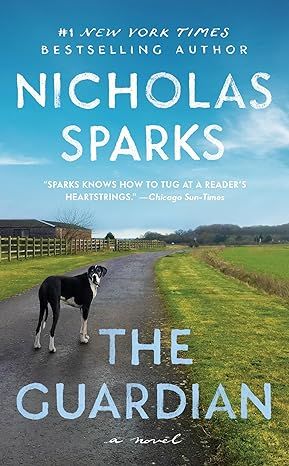
The Guardian
4.5
-
12,153
$0.99
Similar Books
Best sellers
View all
The Tuscan Child
4.2
-
100,022
$8.39

The Thursday Murder Club: A Novel (A Thursday Murder Club Mystery)
4.3
-
155,575
$6.33

Sapiens: A Brief History of Humankind
4.6
-
140,302
$13.49

The Butterfly Garden (The Collector, 1)
4.3
-
88,556
$9.59

Things We Hide from the Light (Knockemout Series, 2)
4.4
-
94,890
$11.66

The Last Thing He Told Me: A Novel
4.3
-
154,085
$2.99

The Perfect Marriage: A Completely Gripping Psychological Suspense
4.3
-
143,196
$9.47

The Coworker
4.1
-
80,003
$13.48

First Lie Wins: A Novel (Random House Large Print)
4.3
-
54,062
$14.99

Mile High (Windy City Series Book 1)
4.4
-
59,745
$16.19

Layla
4.2
-
107,613
$8.99

The Locked Door
4.4
-
94,673
$8.53
